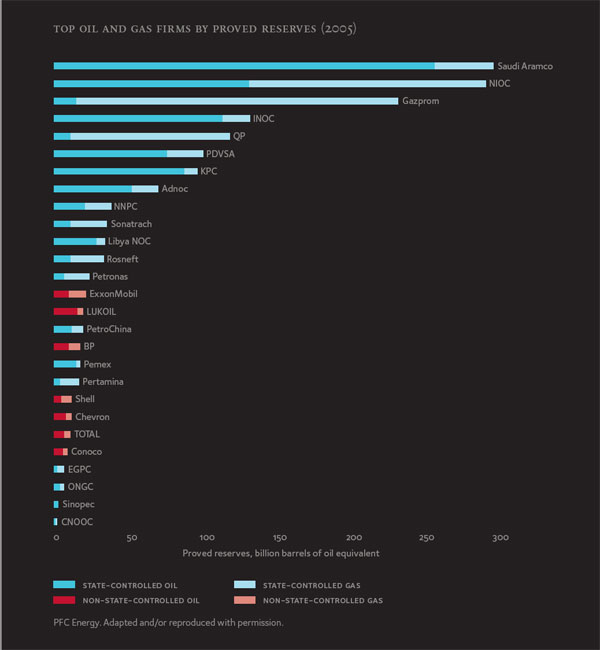“Oil prices may be a function of the laws of supply and demand, but the global oil market does not operate freely. At least 75 percent—and by some estimates as much as 90 percent—of all oil and natural gas reserves are held by national oil companies (NOCs) that are either partially or fully controlled by sovereign governments, which often do not have the same incentives as profit-maximizing firms to supply oil to the market,” the report noted. “Besides being politicized, the oil market is also distorted by the presence of large economic externalities, such as military expenditures, that are not directly accounted for in the price paid by consumers.” (See illustration below.)
State-Controlled National Oil Companies (NOCs) Hold Most off the World's Oil and Gas Reserves. The Six Largest NOCs have Ten Times the Reserves of the Top Six Privately Owned Companies.

What to do about it? Highlights of the report’s recommendations are provided below. A copy of the full report is available for download: A National Strategy For Energy Security.
Diversify Energy Supplies for the Transportation Sector: Since transportation represents about two-thirds of total oil consumption, it is the natural place to start in reducing consumption levels. The key, the commission says, is to “successfully electrify our ground transportation vehicles, so that we fundamentally reduce the nation’s oil dependence.”
The Council has published a series of policy recommendations for the government to help accelerate the development of both electrical vehicle technology and the enhancement to the electric grid infrastructure needed to support those vehicles. It views a future where that grid is supplied power by a range of technologies, from coal to wind to nuclear.
Increasing Energy Access: Expanding Domestic Supply: The Council believes the United States possesses significant reserves of oil and gas that can be developed in the coming years and used to directly offset imports.
The report says the government should reduce restrictive laws and bureaucratic roadblocks to accessing oil both onshore and in offshore waters.
“Though the country will still require a significant amount of oil in the transportation and industrial sectors [even as electric cars come to market], a greater portion of that oil will be produced within the United States, preserving national wealth and reducing the amount of America’s oil consumption that is directly vulnerable to a catastrophic oil supply interruption,” the report says.
Accelerating the Development and Deployment of New Energy-Related Technology: US government research spending on energy has fallen dramatically in the last 30 years, and R&D by private US companies fell 50% between 1991 and 2003 (largely attributable, it would seem, to the low energy prices during that period).
Regardless, the Council says that not only must energy R&D spending be increased and encouraged, “a new sense of mission and purpose must be cultivated using a goal-oriented approach within relevant federal agencies, national laboratories, universities, and the private sector.”
Reducing Demand for Oil: Improving Efficiency: The Council supports changes in the Corporate Average Fuel Economy (CAFE) standards to get overall fuel efficiency of US cars to about 35 miles per gallon by 2020. It likes recent changes to CAFÉ regulations that get down to improvements at the individual vehicle level, not the blanket, fleet-level requirements for automakers that existed previously.
To date, truck manufacturing has not been subject to CAFÉ rules. However, the Council would like to see standards there, and “believes 4 percent annual rates of improvement in fuel economy are attainable for the nation’s medium- and heavy-duty vehicle fleet. Indeed, we are convinced that an aggressive but cost-effective pursuit of the highest possible fuel economy is essential for U.S. national security.”
Managing Risks and Global Issues: Energy must more explicitly be an integral part of overall US security, the Council says.
“The Department of Defense, the State Department, and the various branches of the intelligence community must consciously focus on issues of energy supply as part of their comprehensive pursuit of national security,” the report states. “Working in concert, they must develop policies and strategies that protect the global infrastructure, secure key geographic transit areas, and mitigate political instability in energy-supplying countries.”
In the end, the first recommendation, on moving rapidly towards electric vehicles, is the major piece of the Council’s recommended strategy.
On a recent radio interview, FedEx’ Smith said he did not believe natural gas-powered vehicles were the way to go, as that fuel would be better applied to other industrial applications.
“The Council maintains that fuel diversity is the key to energy security,” the report concludes. “For decades, the nation has been exposed to the concentrated risk of oil dependence. Going forward, multiple and redundant energy options must be pursued in order to preserve the nation's strategic flexibility. Within the transportation sector, electrification represents the pathway to meaningful fuel diversity that will end our dangerous dependence on petroleum.”
What’s your reaction to the Council’s recommendations? Can we get to electric cars for the general population soon? What else would your recommend to reduce oil costs and dependence? Let us know your thoughts at the Feedback button below.